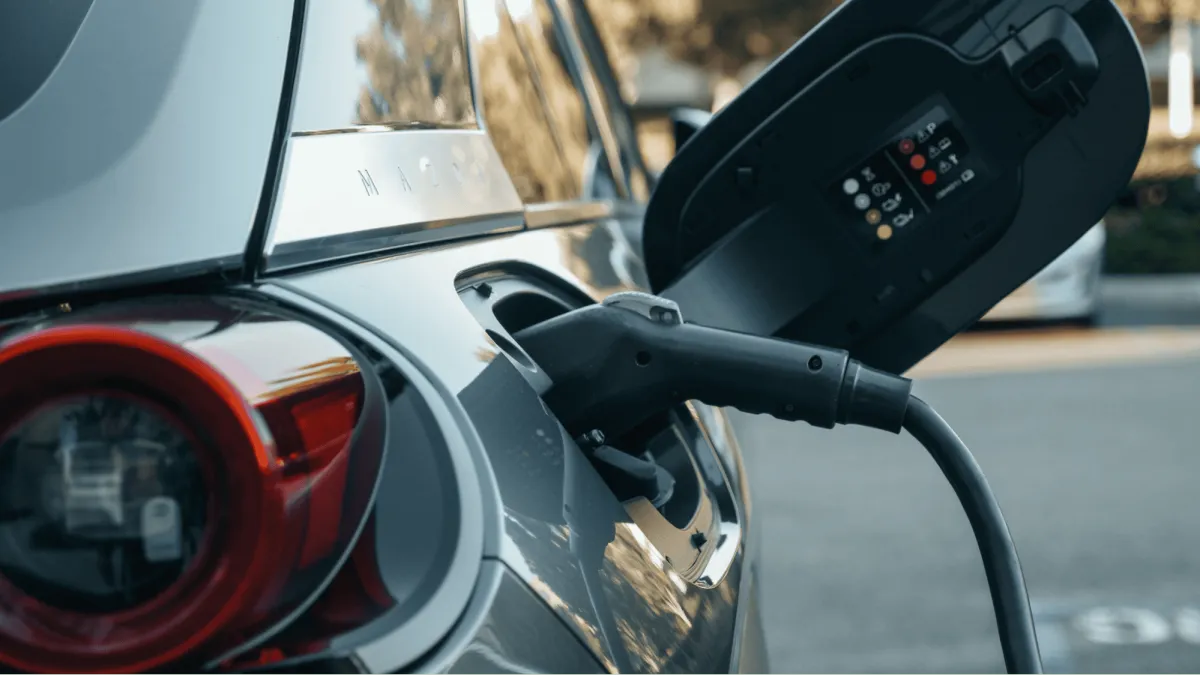Never wait for help. We're available 24/7.
Call Now: 781-782-2382
Never wait for help. We're available 24/7.
Call Now: 781-782-2382

Electric vehicles are becoming a common sight on our roads today. This shift makes finding a qualified EV charger electrician in your area more essential than ever. Charging stations now dot our landscape from workplaces to homes and public spaces, showing how vital these installations have become in our everyday lives.
Massachusetts sets high standards with strict licensing requirements for electricians. Boston's homeowners and businesses should carefully select the right professional for their EV charger installation needs. The expertise and complex nature of electrical work commands respect, as licensed electricians in our state earn $63,000 to $83,000 yearly. Let us help you select and hire a qualified EV charging installation expert. We'll ensure you meet local regulations and make the most of available incentives.
You need to understand technical specs and local requirements before you install an EV charger in your Boston home. Massachusetts has strict rules to keep electrical installations safe and efficient.
Boston homeowners can pick from these three charging options:
Level 1 chargers plug into standard 120V outlets using the cord that comes with your vehicle. These give you about 3-5 miles of range per hour of charging. They work well for overnight charging.
Level 2 chargers work on 240V circuits and charge 10-20 times faster than Level 1. Most homes have these installed as they can fully charge most EVs overnight.
DC Fast Chargers (DCFC) charge rapidly but need extra transformer capacity and utility upgrades. That's why you don't see them much in homes.
You'll need an electrical permit to install any EV charging equipment in Boston. A licensed electrician must do the work to meet Massachusetts Electrical Code standards. Boston's EV Readiness Policy says new developments must have 25% of parking spaces EVSE-installed with working Level 2 chargers. The other 75% should be EV-Ready for future setup.
Level 1 charging needs a 15-20 amp breaker on a 120V circuit - just like regular home outlets. Level 2 charging runs on a 40-50 amp breaker with 208/240V circuits, much like electric dryers. Your electrical panel should have at least 10 more amps available than your charging station needs.
The choice between hardwired and plug-in options depends on your needs. Hardwired chargers link straight to your home's electrical system and can charge faster (up to 60 amps). They also come with better safety features and built-in ground fault protection.
Plug-in chargers are more flexible and easier to set up. They connect to NEMA outlets (usually NEMA 14-50) and you can move them if needed. The setup costs less for plug-in options, but they max out at 50 amps. Both types need a licensed electrician nearby to install them safely and meet all standards.
Getting a dependable electrician to install your EV charger needs proper research and fact-checking. The original focus on proper credentials will make sure your installation meets safety standards and code requirements.
Massachusetts keeps strict control over electrical work through the Board of State Examiners of Electricians. Your EV charger installation needs either a Master Electrician license holder or a Journeyman Electrician who works under a Master's supervision. You can check a license on the ePLACE portal or reach out to the board at (617) 727-9931. A properly licensed electrician is crucial—work done without proper licensing could void your home insurance and create issues when you sell your property.
Direct experience with EV charger installations plays a vital role. Look for electricians who know load management technology that helps multiple chargers share electricity efficiently. Skilled installers can help you avoid pricey electrical upgrades by using smart solutions. The specialists on Eversource's approved installer list have gone through specific vetting for EV charger installation expertise.
Customer feedback gives a clear picture of an electrician's reliability and work quality. Browse through Yelp and Google Reviews to find specific mentions of EV charger installations. Look for comments about communication, timing, and how they handle problems. Reviews that mention proper permitting practices are particularly important—some installers skip permits to cut costs, which puts homeowners at serious risk.
Here's what you should ask before hiring:
Do you have a Massachusetts license and EV charger installation experience?
Will you get all needed permits and schedule required inspections?
Can my current electrical panel handle the extra load, or do we need upgrades?
What load management solutions can you suggest to boost efficiency?
Does your work come with parts and labor warranty?
Can you help me apply for available rebates and incentives?
The best electrician will do more than just install your charger. They'll help you understand Massachusetts' rebate programs and make sure your installation qualifies for all available incentives.
Boston homeowners need to know several key steps in the EV charger installation process before the work starts. You'll go through a well-laid-out process after picking a qualified electrician. This process will give a safe and quick way to charge your electric vehicle.
Your electrician will review your home's electrical capacity to see if it can handle an EV charger. They'll analyze your electrical panel, wiring, and your home's power needs. Your home likely has enough capacity for Level 1 or Level 2 charging systems. The electrician needs specific details about your home to make this call. You should have ready:
Photos of your electrical panel
Information about existing electrical appliances
Square footage of your home
Details about any electric heating systems
You might need to upgrade your service or install an energy management system if your panel lacks capacity. This system controls power to stop overloads.
EV charger installation costs usually run between $799 and $1,999. Here's what affects the price:
Proximity to power source - Installing costs less when your charging spot is near your electrical panel
Installation type - You'll see different prices for hardwired versus outlet installations
Electrical upgrades - Panel upgrades are a big deal as it means that costs will rise
Site-specific factors - Trenching and landscaping can drive up installation costs
Note that installation costs vary widely based on your specific situation, so don't rely too much on averages. On top of that, you'll need to buy the charger itself, with Level 2 charging stations starting at about $400.
Your EV charger installation time depends on how complex the job is. Simple setups take just a few hours. More complex ones that need electrical upgrades might take a full day or longer. Massachusetts law says each city or town must give you a permit within 5 days of asking, then check the finished work within 5 days.
Local authorities must inspect and approve the installation to make sure it follows Massachusetts Electrical Code. This step keeps everything safe and legal. Your licensed electrician should take care of all permits and schedule inspections. You should also ask your utility company before installation to check if your property has enough power supply.
EV charger installation requires a big investment. Boston homeowners can cut down their costs through several rebate programs that make electric vehicle charging more affordable.
The Massachusetts Electric Vehicle Incentive Program (MassEVIP) helps homeowners install EV chargers. The Public Access Charging Program covers up to 80% of hardware and installation costs for non-residential locations with public parking. Each street address can receive up to $50,000. Government properties get better benefits with 100% cost coverage. MassEVIP also supports multi-unit dwellings by covering up to 60% of Level 2 charging station costs.
Eversource gives rebates up to $1,400 to help with wiring or panel upgrades needed for Level 2 chargers. People living in Environmental Justice communities might get higher rebates up to $2,000. National Grid's Turnkey program offers upfront rebates that could eliminate your costs completely in some cases. Their customers on the Discount Rate (R-2) can get up to $700 for qualified charging stations.
The Alternative Fuel Vehicle Refueling Property Tax Credit covers 30% of charging equipment costs, up to $1,000 per charging port. You can claim this credit for equipment installed between January 1, 2023, and December 31, 2032. The requirements include:
Install the equipment at your principal residence
Use IRS Form 8911 when filing your tax return
Keep all receipts showing purchase and installation costs
Your local EV charger electrician can make the incentive application process easier. Massachusetts licensed electricians know these programs well and can provide the right documentation. They make sure your installation meets all rebate requirements, including using Energy Star compliant equipment from the State Appliance Standards Database. Many electricians handle the rebate paperwork for you to help maximize your chances of approval.
Professional expertise and careful planning make the switch to electric vehicle charging smoother. This piece covers everything about EV charger installation - from picking qualified electricians to meeting local requirements and getting the most from available incentives.
Licensed electricians ensure safe, code-compliant installations and guide homeowners through complex technical decisions. Their knowledge proves invaluable to determine proper charging levels, evaluate electrical capacity, and set up smart load management solutions.
Boston homeowners can definitely benefit from generous incentives right now. Federal tax credits, state programs, and utility company rebates offer substantial savings to early adopters. Rising EV adoption rates and these incentives make home charging infrastructure a smart investment today.
A successful EV charger installation needs complete preparation and qualified professionals. Time spent on research, credential verification, and understanding your options leads to seamless installation and reliable charging for years to come.
Q1. How much does it typically cost to install an EV charger in Boston?
The cost of installing an EV charger in Boston generally ranges from $799 to $1,999. However, the final price can vary depending on factors such as the proximity to the power source, type of installation, and any necessary electrical upgrades.
Q2. Do I need a special electrician to install an EV charger?
Yes, it's recommended to hire an electrician with specific experience in EV charger installations. In Massachusetts, the electrician should be licensed and familiar with local electrical codes and permit requirements for EV charger installations.
Q3. What types of EV chargers are available for home use?
There are three main types of EV chargers for residential use: Level 1 chargers (standard 120V outlet), Level 2 chargers (240V circuit, most common for homes), and DC Fast Chargers (less common for residential use due to high power requirements).
Q4. Are there any incentives available for installing an EV charger in Boston?
Yes, there are several incentives available. These include federal tax credits, Massachusetts state incentives, and utility company rebates. For example, Eversource customers can receive rebates up to $1,400 for necessary upgrades, and there's a federal tax credit of 30% of charging equipment costs, up to $1,000 per charging port.
Q5. What should I expect during the EV charger installation process?
The process typically involves an initial electrical assessment of your home, obtaining necessary permits, the actual installation (which can take a few hours to a full day), and a post-installation inspection. Your electrician should handle permitting and inspection scheduling, and can also assist with applying for available rebates and incentives.

Website by Up & Social